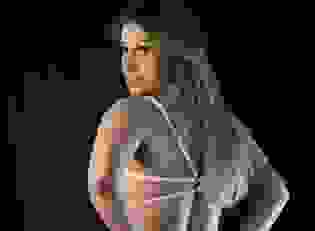Note: You can change font size, font face, and turn on dark mode by clicking the "A" icon tab in the Story Info Box.
You can temporarily switch back to a Classic Literotica® experience during our ongoing public Beta testing. Please consider leaving feedback on issues you experience or suggest improvements.
Click hereBut one of these sets of numbers got to him. That blacks died violently, and their rates of survival just didn't compare to the rates of other groups. So he began to focus his attention there, among the survival rates of ER patients by race. And within weeks new patterns emerged.
If you were white, you were ten times more likely to make it out of the ER than if you were black—and that held true even after accounting for the severity of the initial injury. 'But I'm not a racist!' Tanner told himself after going over his latest round of statistics. 'But what if I start keeping track of deaths per physician? What will that tell me?'
And the result was so obvious his stomach turned. The rate was the same for every doc on the floor.
'No more,' he told himself. 'No good can come from this.'
Instead he resolved to watch his residents more closely, and what he found then was almost equally upsetting. White kids with bad lacerations received careful suturing, while the work done on black kids was barely adequate, so he made an attempt to get to know the residents better, see if he could better understand why this was happening.
Yet he couldn't detect any overt racism after he talked with the physicians he worked with. So was this, he wondered, an unconscious process? And if that was the case wasn't he looking at something systemic, something beyond easy homespun remedies. And now thoroughly unsettled after trying to deal with these revelations he found himself consciously drawn to caring for the poorest of the poor, to the completely marginalized and the destitute. And, by and large, these were almost always black people—and that realization sickened him. Could it be that, fifteen years into the twenty-first century, we were still dealing with the aftereffects of slavery and the institutionalized racism of the Old South?
He remembered his father talking about his experiences of the summer of '67, when America's post Civil War legacy of institutionalized unemployment, abusive policing, and poor housing all came to a head. Race riots broke out all over the country starting in May, with huge, pitched battles taking place in Newark and Detroit by July. Things seemed to settle down after those convulsions, at least until Martin Luther King and Bobby Kennedy were gunned down. But then Richard Nixon won the election in '68 and everything started to go downhill after that. Fast, too.
His father had just finished the second year of his general surgical residency in May '67 when he received notice of his eligibility to be drafted, so after a brief discussion with members of his local draft board he'd opted to go into the Navy. As a surgeon, he reasoned, he'd sit out his "enlistment" in Hawaii or more likely San Diego, and after a few years working on his suntan he'd muster out and resume his post-doctoral education. Probably in LA, or maybe even Hawaii. It would be...fun.
Except things hadn't worked out that way.
After a quick detour through an abbreviated officer's training program his father landed in Hue City about two months before the Tet offensive kicked the war in Vietnam into overdrive, and he spent the first year of his war at a battalion aid station just north of Hue City; the second he spent on aircraft carriers working off the South Vietnamese coast, at Dixie Station. And at one point Doug Tanner learned there was no amount of liquor he could get into his old man that would loosen him up enough to talk about what he'd experienced over there. After just one attempt his mother warned him off.
But his mother was gone now, though his father was still alive. He'd been living, alone, in the same house in Rockport he'd purchased when he came back from Vietnam. And even that was odd, too, because his father never left the Navy; he did his twenty then managed to keep practicing until failing eyesight finally turned the clock past midnight. Now the old house stood like a monument to the war between a father and his son, a never-ending series of skirmishes and retreats that signified nothing much beyond stubbornness and injured pride.
So, the one constant between Doug and his father was a distance that could never be bridged, and that constant still held true. They didn't call one another, neither did they write. The last time Doug had seen his father was at his mother's funeral, and they said not a word to each other; Doug assumed that was the way things would end between them.
And then his sister Meghan called one evening, about a year after Macy left.
"I've moved in with Dad," she told Tanner. "He can't see much now and the neighbors have had to call the police a couple of times."
"Because he can't see?"
"No, Doofus. He walks out into the middle of the street. Marjorie says it's like he wants to get run over."
"Are you ever going to stop calling me Doofus?"
"Why would I do that?"
"Because I'm your big brother and I can still outrun you."
"In your dreams, Doofus."
"So, you moved back into your old bedroom?"
"Yup."
"What's that like?"
"Weird. No dust, anywhere. Clean sheets and towels."
"Pure Navy," Doug sighed. "Some things'll never change."
"He's changing, Doug, and fast."
"Oh? What's up?"
"He's not, for one thing. I never saw him playing the depressed old man, but he's working the role for all it's worth right now."
"Dad? Depressed?"
"Doug, I know you two never saw eye to eye, but I think it's time you came home and broke bread. I think you're running out of time, if you know what I mean."
"Can you pick me up at Portland?"
Sure she could. Which was why Tanner happened to be on a flight from Miami to Maine two days later. Which was when he bumped into Macy Beresford.
Isn't life strange? The way the unexpected slips up from behind and taps you on the shoulder?
+++++
Meghan watched her brother as he stepped out of the terminal and into the driving snow, still dressed like he was headed out to dinner in Miami Beach. Then she saw he had brought one small duffel and knew he wasn't planning on staying long, so she felt let down. Again. Which was nothing new between them. She tooted the horn and he looked through the ripping snow until he saw her, then he bent into the gale and made for her ancient Honda, wondering for the millionth time why on earth anyone would voluntarily choose to live in Maine.
She reached over and unlocked the door just as he reached for the handle, and he crawled inside after he tossed his bag into the back seat. She watched as he buckled in then slipped into the light stream of traffic, heading back to the interstate. "Bring anything warm?" she asked.
"As long as no one threw out my old stuff I should have a coat or two."
"What? You haven't gained any weight since high school?" she asked.
And he shook his head. "Doubtful. Might have lost a few, but I don't really spend a lot of time on the scales."
'Ah', she thought, 'the first subtle dig of the spur.' Meghan had struggled with weight all her life and now probably weighed fifty pounds more than she had as a senior in high school. "How long can you stay?"
"Until I get a handle on things."
'The second attack, and so fast! Big brother rides in to save the day. Again — because I'm so incompetent!' She shook her head. "You wanna stop off at Bean's for some gloves?"
But he just shook his head. "Who is he seeing locally?" he asked.
"Peterson. You remember him?"
"Yup. You've talked to him, I assume?"
"No, I haven't, Doug. Dad told everyone at the clinic not to talk to us."
"Isn't that special," Tanner sighed. "Any idea why?"
"Other than hating me and not trusting you? No, nothing else comes to mind."
"Okay. So, tell me about you. What's going on?"
"Still teaching in Camden. No change."
"New partner, anything like that going on?"
"No," she snarled. "What about you?"
He leaned back for a minute then exhaled. "Had a close call a couple of years ago, lasted a year. I hadn't seen her in ages but she turned up on my flight."
"No shit? What was that like?"
"She was one of the flight attendants. She's married now, sounded happy. It was good to touch bases."
"Really?"
"Yeah. Call it closure. Watch it...that's black ice up there..."
"You wanna drive, smart-ass?"
"Nope. Take my word for it, I haven't driven on snow in ten years."
"I know."
"So, you think dementia's set in, something like that's going on with him?"
"Not my area of expertise, Doug."
"Okay, so...what if it is? You thought much about that?"
"Doug, whatever you might remember about him, well, he's gotten really mean."
"Meaner than he was?"
"Yup."
"And you moved in with him?"
"He's my father, Doug. Yours too, I seem to recall."
He turned and looked out the window, lost in thought. How many times had he taken this same route, from Rockport to Portland. A thousand times if it was one, and even the trees looked unchanged. He looked out in the general direction of the sea as they crossed the bridge in Bath, then she pulled into the big Irving station outside of Damariscotta and he filled up her tank.
She thanked him but she finished the drive in an old, familiar silence, a silence that seemed have found them all too easily. Maybe like fighters who had retired to their respective corners to plaster an old wound or two, wounds that had suddenly come undone. Not exactly unexpected but certainly not welcome.
After winding their way through Rockport, Meghan turned on Winter Street and then into the driveway to her father's house. To the house she could never bring herself to call home. Her brother watched her for a moment — in that way physicians' often do. Visually taking a measure of a patient's response to subtle questioning on the way to a working diagnosis...taking a measure of the moment. He saw the pounding vein in her right temporal region, took note of the twitch under her eye and the sudden shaking hands.
"You okay, kiddo?" he asked.
And she shook her head. "No, not in the least. I'm afraid what you two are going to do to each other."
He nodded, but all the same he reached over and took her hand in his. "If it gets too bad, just tell me to back off, okay?"
She kept nodding, then she started slowly shaking her head. "I don't feel right, Doug. Something's not right."
He came around and opened her door, noted there was already about six inches of snow on the ground and that it was coming down hard now. He helped Meghan stand and just held onto her for a while, and she melted into him more than he'd imagined she might. When she was ready they turned to face the music and began walking up the old brick walk to the front porch. And when he saw the front door was open about an inch, he too began to feel something was off.
"Stay here," he said to his sister, then he stepped into the entry.
His father was sitting in his favorite chair by the fireplace, and the fire was still burning nicely, casting shadows enough to just make out the devastating self-inflicted gunshot wound in the flickering light. His father's old Commander Model 1911 Colt had fallen to his lap, and Doug walked over to him and out of stony habit he felt for a pulse. The top half of his father's face was gone now, but that oh-so-familiar skin of his was still warm. Probably the fireplace, he thought as he walked over to the phone and dialed 911.
"Can I come in now," Meghan called out.
"No, not just yet," Doug Tanner said carefully. "Give me a minute."
+++++
Realtors were already circling the house like sharks, leaving business cards with their practiced notes of condolence. His father's affairs were in perfect order, naturally, and he'd left everything to his two children—again, naturally. And he'd passed a wealthy man, leaving his kids an estate worth something on the north side of five million dollars, give or take market valuations. Tanner read through his father's chart at the clinic, saw the inoperable glioblastoma diagnosis entered after an MRI completed a week before his death, and it all fell into place right then and there. His father knew the score and he'd decided that was one road he didn't want to take. Only now...there were so many things he wanted to talk to his dad about, and that lack of closure hurt. That, and his old man hadn't even wanted to say goodbye, to either of them. 'How true to form,' he sighed.
Meghan wanted nothing to do with the house, nothing to do with her father's money, so Tanner did what he thought best. He transferred everything to a trust, because one day his sister would come back to life and he wanted things to be ready for her. He called a friend from high school, a contractor now who had a decent reputation, to go over the house with a practiced eye, so Tanner could keep everything in good repair. And once all the paperwork was out of the way he took his sister with him back to Florida, away from all the cold and death and the never-ending babble about taxes and what to do next.
She stopped eating for a while, but then he took her sailing—over to the Bahamas—for two weeks. She swam and ate conch fritters and he fixed her strong drinks full of potent rum and she finally started to come back to him, to life. She'd let herself go long before, of course, and the road back wouldn't be easy, but it was his place to do these things now. Because it was a road he'd have to take with her to see it done right.
But of course he went back to work and work pulled him in deeper and deeper with each passing shift and soon enough he saw Meghan falling into the same kind of despair she always had. Their father had abandoned them to work, left their mother to assume all the duties of parenthood, and that was a role so unfamiliar to her that she had been doomed to fail from the beginning. Good teachers and a caring neighborhood had helped carry the load for a while, but in the end their mother ate her way out of her misery until an early heart attack took her away, but the damage had by then been well and truly done. Yet Doug escaped this benign neglect, while Meghan had been buried under the weight of their helpless mother's simmering frustrations. Even so, Doug had long ago concluded that his father was the real villain of their story.
+++++
Another year down.
Meghan in graduate school, back in Maine and living in the Old Man's house.
Tanner still alone. Still working 'eight days a week.' SSDD, as in Same Shit Different Day. His last year of residency, when big choices loomed, the year major change became unavoidable. Questions like where to start a practice, but little ones trailed along, too, like 'do I fix the transmission again or break down and finally buy a new car?' Or: he almost liked Miami Beach but in the end he really disliked Florida, especially the endlessly oppressive humidity. He liked living on the boat but he was waging a constant battle against mold and mildew. He wanted a dog and a yard and yeah, he wanted a wife and kids—yet the boat might not be the best way to go about doing that, ya know?
And when those thoughts came on hard and fast it always seemed like a fresh parade of broken dreams would come in through the ERs doors to remind him of all the hazards ahead. Another mangled marriage, more blood on the gurney, another gunshot wounds to the groin only one way furious resolutions were arrived at. Another overdose, or do we call it what it really is? Suicide, without the courage to face the pain? Or was that one a cry for help? Or, God forbid, a real accident? How many good people chased the dream only to find that it wasn't in the cards. Not for them, anyway. Bad choices seemed to develop a momentum all their own, and the courts and the prisons were ready and willing to change that course for you, once you were discharged from the hospital, that is. Then all your bad choices turned into a cyclone of penal servitude and mounting court imposed debt. And don't forget you still owe the hospital about a hundred grand for pumping your stomach.
And then it hit him one day. Was that what the realization his Old Man had run into, once upon a time all his own? Was that why so many of his colleagues in 'Nam ended up in dermatology or cosmetic surgery after the war spit them out? Burned out before they could even finish their training? He'd seen as much already, of course. As in peers switching from general surgery to something a little less...stressful? Like after a really bad experience, some even going back to med school...only now to teach?
And he was in his thirties now. Highly trained, certainly, but adrift. The hospital might offer him a position on staff, but then what? Just slip into the grind and watch the years drift by until things went from "maybe tomorrow" to half-past too late? He could, theoretically, even join the Navy—but every time he thought of that he saw his father in his chair with the top of his head blown away—because, in the end, would the outcome really be so different? He was his father's son after all...
But 'like particles' tend to repel unless acted upon by external forces, right? Just as 'opposites' attract? So, had Macy been his opposite, or more similar that that? He'd seen her as an opposite, so what had torn them apart? He'd been more than willing to commit to her, but less so when it came to risking her life to try for a baby again? Had that been the difference? And if so, could such a union ever endure?
And every time he asked that question he saw his mother's broken body laying on a cold slab at the funeral home.
His father's son, indeed.
+++++
Tanner chose the easy way out. He accepted a position on staff. He had the boat hauled and slapped a new coat of bottom paint on her hull. He sold the old Beemer and remembered his father's admonishment that physicians should drive Buicks, not fancy German sports cars. And maybe that was why he picked up a new 911, because he could now so why not?
The hospital parked him in a surgical practice with a dozen other cutters; no more 'eight days a week' but regular office hours. On-call duty one night every two weeks and one weekend every two months. Nights free unless something really off-the-charts happened, like a major pile-up on the freeway. He started going out with old friends, and he made new friends too, and it didn't take long for the inevitable. He was like red meat now, after all.
Her name was Sandy. Sandra McClellan.
She had long red hair and deep green eyes, and she knew exactly what she was looking for in a man. When she met Tanner she latched onto him before he knew what had hit him. She took him to meet her family at one of the local country clubs and "See, you fit right in, don't you?" was the first thing she said. And in a way he began to see through her in that moment, but attraction and love are not at all the same thing. And twelve years of self imposed academic exile had made a blind man of Douglas Tanner, MD.
"Do you always smile like that?" her father Rupert McClellan asked the first time they met.
"Like what?"
"I don't know, but I've been watching and you always seem to be grinning like a fool. I don't know what to make of that, do you?"
And because it wasn't, really, the first time someone had mentioned his smile he tried to brush aside the comment. Besides, his smile really wasn't exactly a conscious thing, it was just that it tended to put patients at-ease and so it had, in a way, become one of the tools of his trade. "Maybe I started smiling more when I began to deal with patients."
"You mean you started smiling like that when you went into residency?"
And he had to stop and think about it, because that wasn't exactly the truth, was it? No, he'd been smiling all his life, so much so that even his father dropped a few snide comments along the way.
"Well, I guess maybe I've been smiling since I was in grade school. I'm sorry, I didn't ever think it was that big a deal, certainly not enough to bug someone."








